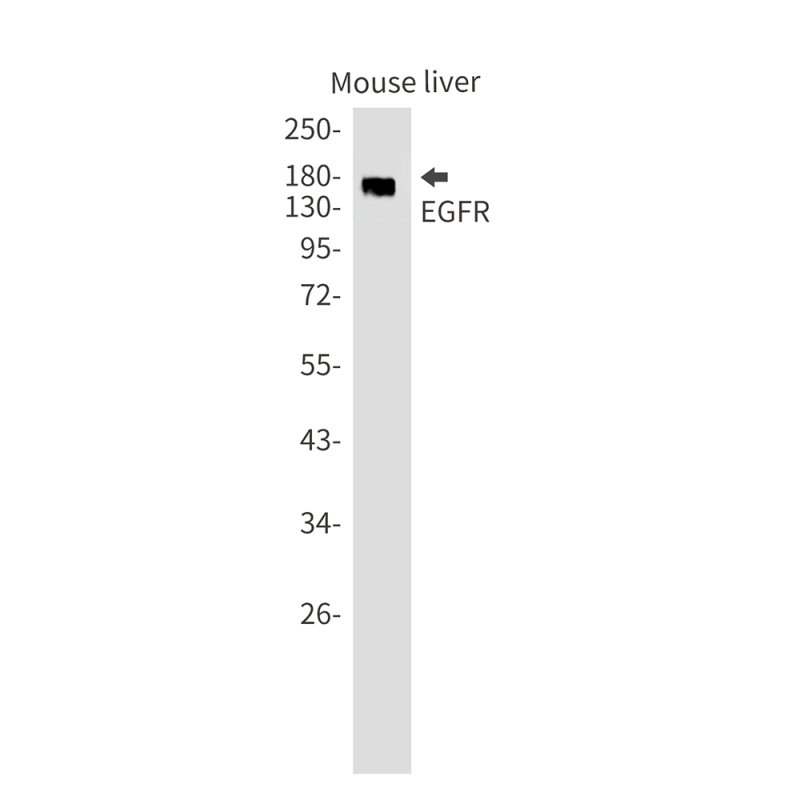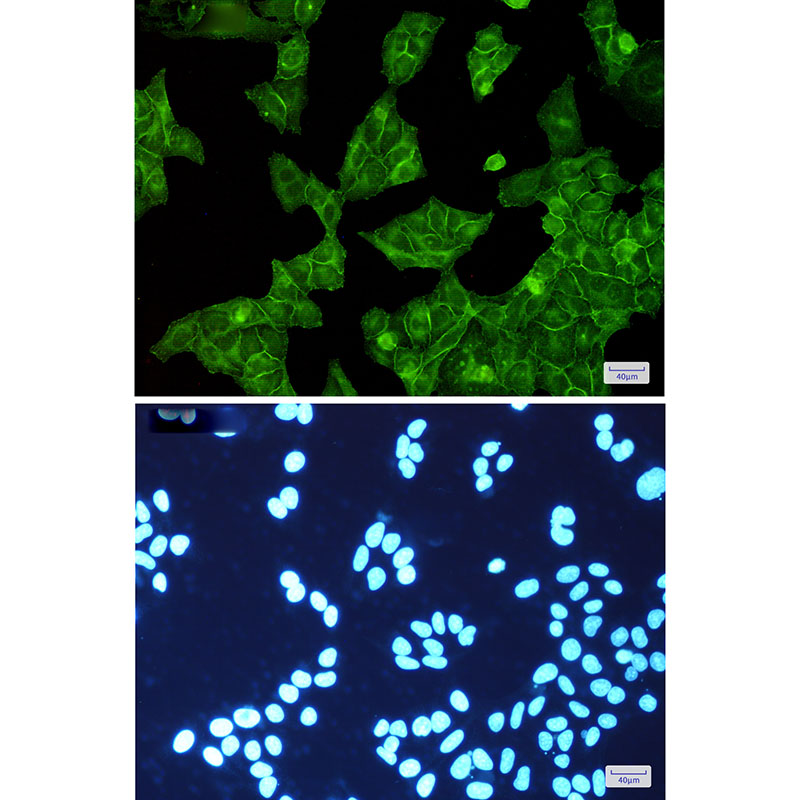


| WB | 1/500-1/1000 | Human,Mouse,Rat |
| IF | 1/20 | Human,Mouse,Rat |
| IHC | 咨询技术 | Human,Mouse,Rat |
| ICC | 1/50-1/200 | Human,Mouse,Rat |
| FCM | 咨询技术 | Human,Mouse,Rat |
| Elisa | 咨询技术 | Human,Mouse,Rat |
| Aliases | EGFR; ERBB; ERBB1; HER1; Epidermal growth factor receptor; Proto-oncogene c-ErbB-1; Receptor tyrosine-protein kinase erbB-1 |
| Entrez GeneID | 1956 |
| WB Predicted band size | Calculated MW: 134 kDa; Observed MW: 175 kDa |
| Host/Isotype | Rabbit IgG |
| Antibody Type | Primary antibody |
| Storage | Store at 4°C short term. Aliquot and store at -20°C long term. Avoid freeze/thaw cycles. |
| Species Reactivity | Human,Mouse |
| Immunogen | A synthetic peptide of human EGFR |
| Formulation | Purified antibody in TBS with 0.05% sodium azide,0.05%BSA and 50% glycerol. |
+ +
以下是3条关于EGFR抗体的参考文献及其摘要概括:
---
1. **文献名称**:Cetuximab monotherapy and cetuximab plus irinotecan in irinotecan-refractory metastatic colorectal cancer.
**作者**:Cunningham D, et al.
**摘要**:该研究报道了西妥昔单抗(抗EGFR单抗)单用或联合伊立替康治疗转移性结直肠癌的临床试验,证实其可逆转化疗耐药并延长患者生存期。
---
2. **文献名称**:EGFR antagonists in cancer treatment.
**作者**:Mendelsohn J, Baselga J.
**摘要**:综述了EGFR抗体(如西妥昔单抗、帕尼单抗)的作用机制及临床应用,强调其通过阻断EGFR信号通路抑制肿瘤生长和转移。
---
3. **文献名称**:Mechanisms of resistance to cetuximab and novel therapeutic strategies in head and neck cancer.
**作者**:Wheeler DL, et al.
**摘要**:探讨头颈癌患者对西妥昔单抗的耐药机制,如EGFR突变、下游信号通路激活等,并提出联合靶向治疗策略。
---
4. **文献名称**:Untangling the ErbB signalling network.
**作者**:Yarden Y, Sliwkowski MX.
**摘要**:解析EGFR(ErbB1)家族信号网络,包括抗EGFR抗体的作用原理及其在调控肿瘤增殖和存活中的应用潜力。
---
以上文献涵盖临床研究、机制综述及耐药性分析,均为EGFR抗体领域的经典工作。
Epidermal Growth Factor Receptor (EGFR) is a transmembrane tyrosine kinase receptor involved in regulating cell proliferation, survival, and differentiation. Overexpression or mutations in EGFR are linked to various cancers, including non-small cell lung cancer (NSCLC), colorectal, and head/neck cancers, making it a critical therapeutic target. EGFR antibodies are monoclonal antibodies designed to block EGFR signaling by binding to its extracellular domain, thereby inhibiting ligand-induced activation and downstream oncogenic pathways.
The first-generation anti-EGFR antibodies, such as cetuximab and panitumumab, competitively inhibit ligand binding (e.g., EGF, TGF-α), prevent receptor dimerization, and suppress autophosphorylation. This disrupts RAS/MAPK and PI3K/AKT signaling, slowing tumor growth and promoting apoptosis. Additionally, some antibodies induce receptor internalization and degradation or recruit immune cells via antibody-dependent cellular cytotoxicity (ADCC).
Clinically, EGFR antibodies are used in combination with chemotherapy, radiation, or targeted therapies. Cetuximab is approved for metastatic colorectal cancer (wild-type RAS) and head/neck cancers, while panitumumab targets colorectal cancer. However, resistance often arises due to secondary EGFR mutations (e.g., T790M), alternative pathway activation (e.g., MET amplification), or impaired immune response. Next-generation antibodies and combination therapies (e.g., with EGFR-TKIs or immune checkpoint inhibitors) are under investigation to overcome resistance and improve efficacy.
Research continues to explore biomarkers (e.g., EGFR expression levels, KRAS status) for patient stratification and optimize therapeutic regimens, highlighting EGFR antibodies as pivotal tools in precision oncology.
×